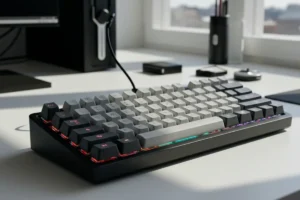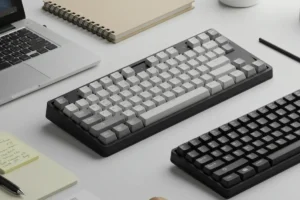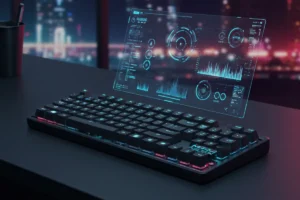So, how do you understand the difference between Wooting keyboards and traditional mechanical keyboards?
Let’s break this down in a way that anyone can understand. Even if you’re 10 years old or Homer Simpson, I promise this will make total sense.
😎 This article isn’t just for the keyboard nerds—it’s for gamers, productivity warriors, and anyone who types.
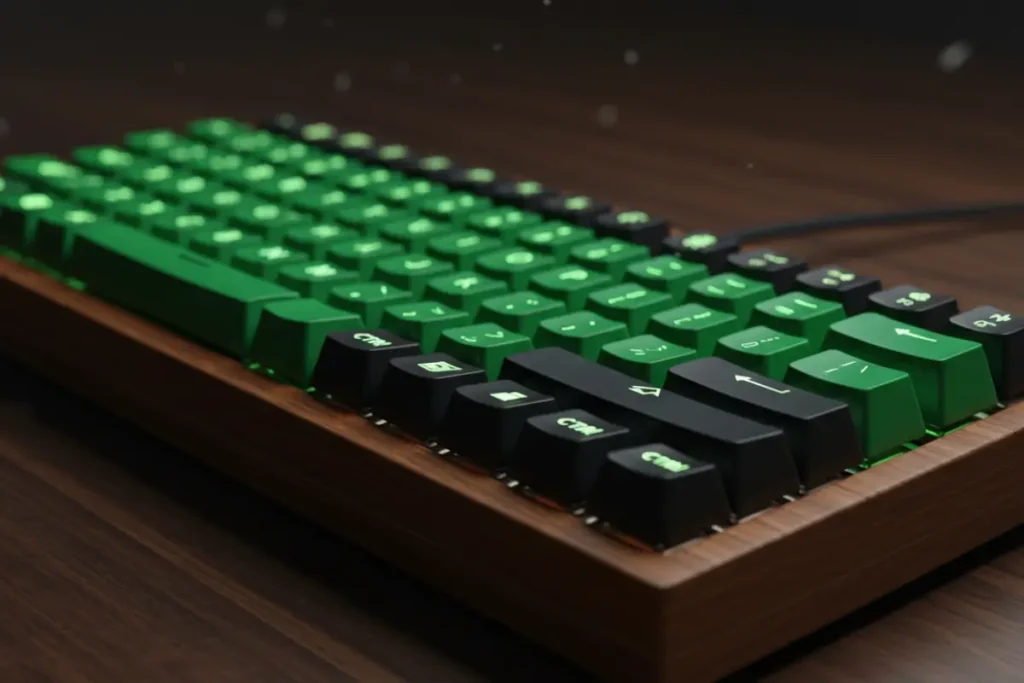
⚡ What Makes Wooting Keyboards So Different?
Wooting keyboards aren’t just another mechanical keyboard brand—they represent a whole new way of thinking.
Traditional mechanical keyboards work on binary input: either a key is pressed or it’s not. Simple. But Wooting uses analog input.
What does that mean? Imagine your keyboard being able to detect how hard or how far you’re pressing a key—just like a game controller’s trigger. That’s analog magic!
Now, here’s where it gets exciting. With Wooting’s Lekker switches (yes, that’s the name—Dutch for “tasty” 😋), you’re not stuck with just one actuation point.
You can customize it. Want your key to trigger at a feather-light 1.0mm? You got it. Prefer a deeper 3.6mm press? No problem.
That means you control the response, not the keyboard. I personally love setting different actuation points for gaming and typing.
When I’m in gaming mode, I make it super sensitive. But for writing articles like this one, I want a deeper press to avoid typos. Total flexibility.
🧠 For more on how adjustable actuation points work, check out The Best Keyboards with Adjustable Actuation Points.
🎮 Why Gamers Are Ditching Traditional Keyboards for Wooting
If you play FPS, MOBAs, or any competitive games, you’ve probably hit that moment where you wished your keyboard could move you just a little bit instead of full sprint. That’s where Wooting dominates.
With analog movement, you can walk, run, creep, or peek—just like a controller. It gives you precise control, something traditional mechanical keyboards simply can’t offer. That’s why a lot of pro players and streamers are switching to Wooting. It’s not hype. It’s legit next-level.
And let’s talk about rapid trigger. You press the key down, let go just a little—and boom—it resets. Perfect for games like Valorant or Fortnite where every millisecond counts.
Wooting even lets you assign two actions to one key depending on how far you press it. Tap it lightly to crouch, press deeper to go prone. Insane, right?
✅ You can see more about this kind of gameplay tech on The Role of Keyboards in Competitive Esports.
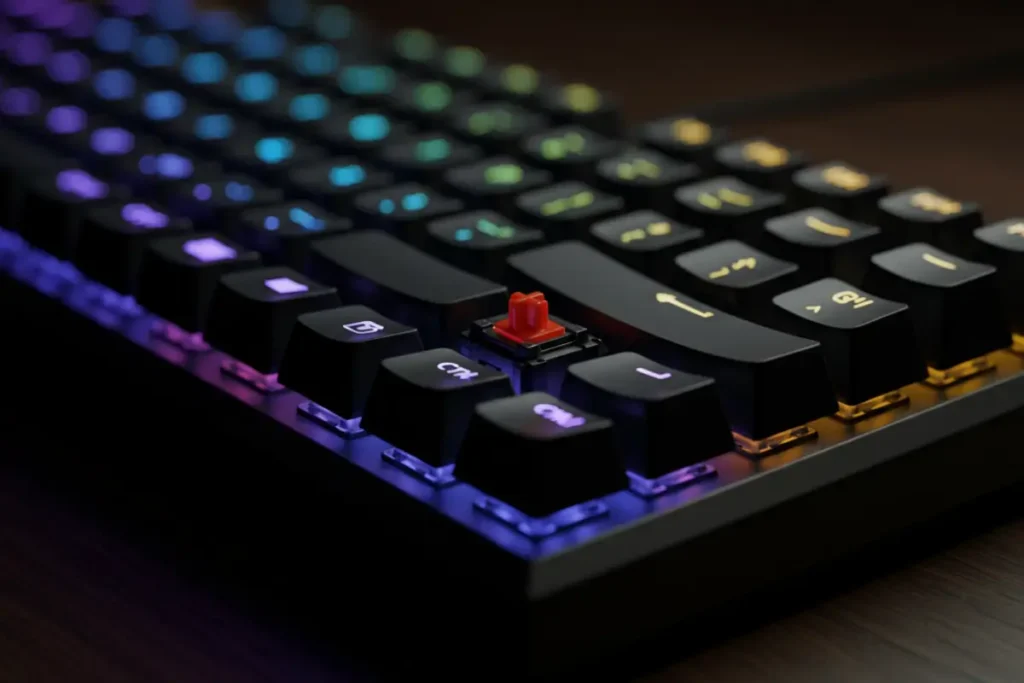
🧰 Customization: Where Wooting Truly Shines
One thing I absolutely love about Wooting is how much you can customize everything.
Traditional mechanical keyboards have some flexibility—sure, you can change keycaps, switches, and maybe remap a few keys. But Wooting takes it way further.
You get full control over:
- Actuation points per key
- Multiple functions per key (dual-stage activation)
- Analog curve profiles
- Rapid trigger settings
- RGB lighting tied to actuation pressure
And all of this is managed in the Wootility software, which is honestly one of the cleanest, most intuitive keyboard software platforms I’ve ever used.
💡 Check out How Keyboards Are Designed: A Look Behind the Scenes to understand more about what makes customizable keyboards so exciting.
🧾 Traditional Mechanical Keyboards Still Have Their Place
Now don’t get me wrong—traditional mechanical keyboards are still awesome. I use them for casual typing, retro gaming, and when I want that old-school click-clack feel.
Brands like Keychron, Corsair, and Logitech have fantastic mechanical keyboards that are durable, satisfying, and reliable.
But here’s the thing: traditional mechanical keyboards are kind of stuck in their ways. They’re predictable, and they don’t evolve fast. Wooting, on the other hand, is actively pushing the boundaries.
There’s a reason people are starting to view analog keyboards as the next evolution of mechanical typing. I still love my classic boards, but when it comes to performance, adaptability, and gaming, Wooting wins—hands down.
📊 Wooting vs Mechanical Keyboard Comparison Table
| Feature | Wooting Keyboards | Traditional Mechanical Keyboards |
|---|---|---|
| Input Type | Analog (pressure-sensitive) | Binary (on/off) |
| Adjustable Actuation | Yes | Rarely |
| Rapid Trigger Support | Yes | No |
| Dual-Stage Key Activation | Yes | No |
| Analog Movement | Yes (controller-like) | No |
| Software Customization | Extensive via Wootility | Varies by brand |
| Typing Feel | Smooth and modifiable | Varied (tactile, clicky, etc.) |
| Best Use | Gaming, advanced users | General typing, casual gaming |
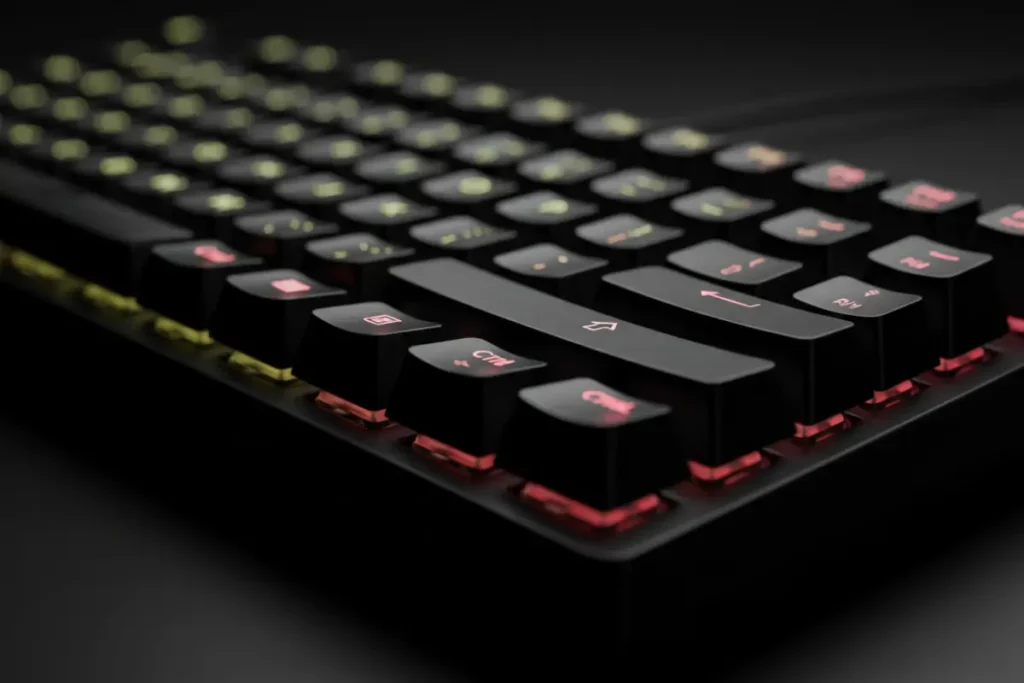
🔗 Learn More from Trusted Sources
If you’re still unsure whether analog keyboards are for you, I recommend checking out this Wikipedia article on Keyboard Technology to get a broader understanding.
See More
- How I Built My Dream Custom Keyboard in 2025 (Step-by-Step Guide)
- Silent Mechanical Keyboards You’ll Love in Quiet Offices (2025 Update)
- The Future of Mechanical Keyboards: What’s Coming After 2025?
🧠 Final Thoughts: Is Wooting Worth It?
Absolutely. As someone who lives and breathes keyboards, I can honestly say that Wooting keyboards have blown my mind. They’re not just a gimmick—they’re a real, tangible upgrade.
I recommend them to anyone who takes gaming seriously or who wants to be at the bleeding edge of keyboard innovation.
I’ll still keep using my traditional keyboards for some tasks, because variety is the spice of life. But if you told me I could only keep one? I’m going with Wooting every single time.
If you’re still in doubt, you can always explore more articles on Keyboards Technology like:
- Gaming Keyboards Ranked from Budget to Pro-Level
- Mechanical vs Optical Keyboards: Which One Is the Future?
- How to Optimize Your Keyboard for Competitive Gaming
Hey! If you liked this article, don’t forget to share it with your friends who love gaming or keyboards. Also, leave a comment below—what keyboard are you using right now?
🎮 Join Our Discord Community!
Are you passionate about keyboards, gaming, and tech? Come hang out with fellow enthusiasts, ask questions, share your setup, and stay updated with our latest content!
👉 Join Now